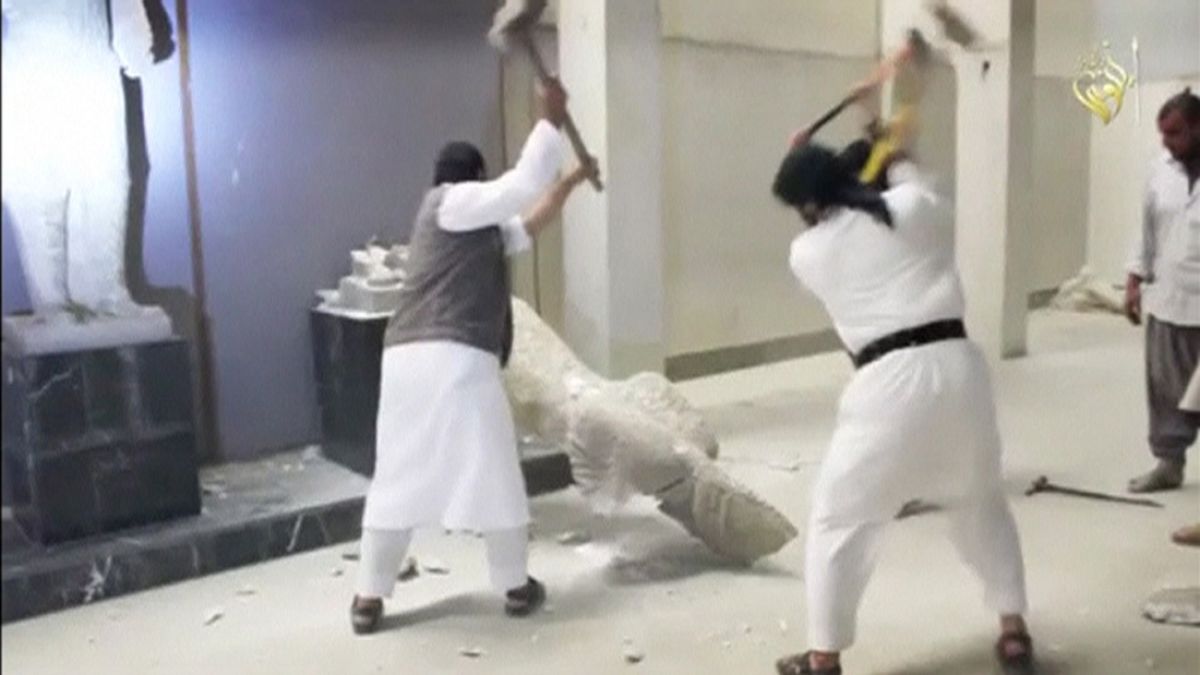The UN's educational, scientific and cultural organisation has called for a regional and international alliance to counter the extremists' acts of destruction that it calls 'war crimes'.
The destruction by ISIL militants of many of Iraq’s archaeological treasures has provoked international outcry.
Since summer 2014, the US-led coalition has been targeting jihadist positions in Iraq. But the Iraqi Tourism and Antiquities Minister now seems to have accused the coalition of not doing enough to protect the country’s priceless heritage.
Adel Shirshab told a news conference in Baghdad that Iraq is still waiting for the Security Council to react and is calling for air power to be used to stop further annihilation of priceless antiquities.
“We are still waiting for the Security Council to hold an extraordinary session,” he said, adding: “The world should bear the responsibility to put an end to the atrocities of militants, otherwise I think the terrorist groups will continue with their violent acts.”
Historically significant sites in Mosul, Nimrud and Hatra, in the north of the country, have suffered devastating attacks at the hands of ISIL.
"@EjmAlrai: Media report #IS bulldozed Mar Korikos Church north of #Mosul along w/ its cemetery.[FT St Elija #Iraq] pic.twitter.com/3ysr0kQkcY"
— Durruti Column (@zbahs) March 9, 2015
Officials say the ancient Assyrian city of Nimrud was bulldozed, before assailants moved on to the 2,000-year-old-city of Hatra.
The destruction of remains on the site has been condemned by the United Nations as ‘barbarism’.
Euronews has spoken to the Director of UNESCO’s office for Iraq, Axel Plathe – speaking from Beirut.
In an earlier interview at the end of 2014, he described how UNESCO was concerned by the “intentional targeting and systematic destruction of cultural heritage” in Iraq, which had reached “unprecedented levels”.
Alasdair Sandford, euronews:
“Your organisation has called what’s happening ‘cultural cleansing’ and a ‘war crime’. Can you do anything to stop it?”
Axel Plathe, UNESCO:
“We can’t send armies to the sites and to protect them there, UNESCO has not the mandate to send armies. We can however work with our partners, particularly the government of Iraq, in order to see whether we can limit the damages and also prevent hopefully other aggressions against the culture heritage sites. But at the present time it’s very difficult for us to intervene on the ground, the UN has no staff that is presently in the area that is controlled by the terrorist groups.”
euronews:
“The head of UNESCO has called on the political and religious leaders in the region, on the UN Security Council, on the International Criminal Court… what steps exactly would you like to see taken?
Axel Plathe, UNESCO:
“Well the call on the criminal court is a call in order to persecute (prosecute) these actions as war crimes, as they are, and our Director General (Irina Bokova) has also called an emergency meeting of the Security Council in order to ally the international community behind the cause of the heritage protection. We have also called to religious leaders and political leaders in order to say that these crimes have no political or religious justification. And finally what we need to do is to call on the young people to say ‘you have to stand up against these destructions, this is your future that is being destroyed’.”
euronews: “Ultimately aren’t people powerless in the face of ISIL’s barbarity?”
Axel Plathe, UNESCO:
“I don’t think we are powerless in the mid-term to long-term. I believe that with a strong backing by the international community, by members of the Security Council, by the academic community – both the national Iraqi community and the international community – we can create a soft power that replies in an adequate way in the mid-term or long-term.”
euronews: “How many more sites are immediately at risk and what effectively is at stake here?
Axel Plathe: “The sites that are in these areas are counted by thousands. We of course are mostly concerned by the most emblematic sites: we have been shocked by the aggression against Hatra, which is a World Heritage Site – it’s tantamount to aggressing the Pyramids in Egypt or the Birthplace of Buddha in Lumbini in Nepal. So this is really a significant acceleration of destruction. Ashur is on the World Heritage list, the archeological city in Samarra is on the World Heritage list. These are very important sites in Iraq.”
